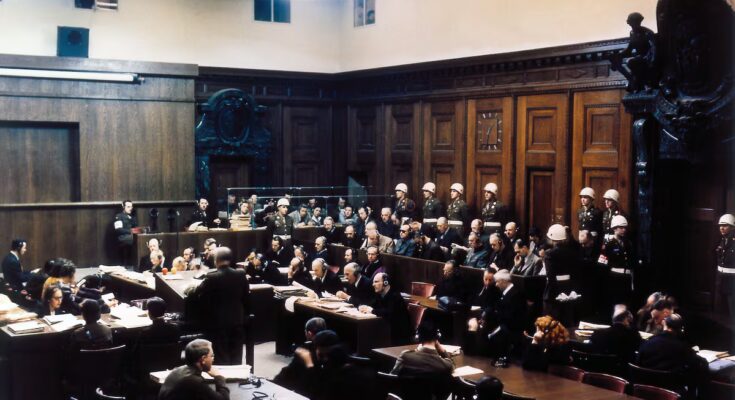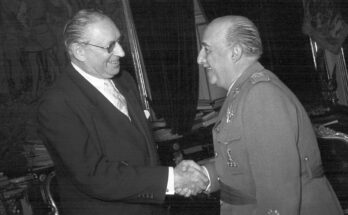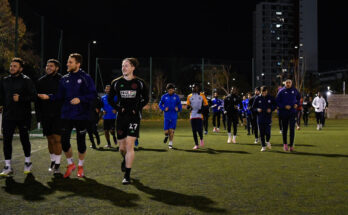Room number 600 of the monumental Palace of Justice in Nuremberg is disconcerting at first glance. It is smaller than the visitor imagines when he opens the door. The decor is different from what existed during the trial of Nazi leaders at the end of World War II, 80 years ago.
Until five years ago, trials were regularly held here and the room still retains the anonymous and functional appearance of a German regional court. It is a half-built place, just like the idea that was born in this same room between November 20, 1945 and October 1, 1946.
In a time of wars and unpunished massacres, from Ukraine to the Middle East via Sudan and other parts of the planet, the edifice of international justice born in Nuremberg has serious cracks.
“If the people who suffered the horror in Ukraine, in Sudan, in Israel on October 7, and in Gaza, in Palestine, they ask themselves what international law has done for them, they won’t answer too much,” jurist and writer Philippe Sands says by phone. Nuremberg and what came out of that trial “could not prevent the horrors of our time,” he adds.
But Sands warns that the idea of international criminal justice is, in historical perspective, very recent: “It is a system that is in its infancy.” He has a trip.
Eight decades ago, in Nuremberg, for the first time the highest officials of a state sat on the bench of an international tribunal. There were 21 men associated with the greatest crimes of the 20th century. There was the highest-ranking living Nazi leader, Hermann Göring (Hitler, Goebbels and Himmler had committed suicide before). Minister and architect Albert Speer. Nazi leader Rudolf Hess. The diplomat Joachim von Ribbentrop. Hans Frank, jurist, governor of Poland and author of the Holocaust. Ideologists like Alfred Rosenberg or Julius Streicher. And soldiers like General Keitel or Admiral Dönitz.
The United States, the Soviet Union, the United Kingdom and France organized a tribunal to try crimes “so calculated, so evil and so devastating that civilization cannot tolerate them being ignored, because it cannot survive if they are repeated.” These are the words, in his opening statement, of the Chief United States Attorney, Robert H. Jackson, who added: “That four great nations, exulting in victory and torn by affront, should restrain their thirst for vengeance, and willingly submit their captive enemies to the judgment of the law, is one of the most significant tributes that power has ever paid to reason.”
Nuremberg was supposed to judge three types of crimes: against peace, against war and against humanity. It ended with three acquittals, seven sentences of life imprisonment or long years in prison and 13 death sentences.
Thus was born what Gurgen Petrossian, jurist of the International Academy of Princes of Nuremberg, calls the idea of Nuremberg, and it is the following: “When a person commits an international crime – be it genocide, crimes against humanity, war crimes or crimes of aggression – this person must take responsibility for it. And this means that, regardless of who, when and where the crime was committed, the fate of these people is decided: it will only be a matter of time before they end up appearing in court.”
After the conviction of the Nazi leaders, 12 more trials were held in Nuremberg until 1949. A year earlier the UN had adopted the Universal Declaration of Human Rights and the Convention on the Prevention and Punishment of Genocide.
Then there were national trials in Germany, starting from the end of the 1950s, which helped this country face alone – no longer imposed by the victors – the responsibility for the murder of six million Jews. There have been trials like the one against Adolf Eichmann in Jerusalem in 1961 or the one against Klaus Barbie in Lyon in 1987. But the idea of international justice is in hibernation. Until the 1990s, with the massacres in the Balkans and Rwanda, which led to the creation of the international criminal courts in The Hague and Arusha.
It was the golden age of the idea of Nuremberg. “We were very optimistic,” says French historian Annette Wieviorka, author of The Nuremberg Trials (Rialp, in Spanish), in reference to “this brief historical moment between the fall of the Wall and the attack on the Twin Towers”. For this reason, he adds, “the lessons of Nuremberg are difficult to apply today”.
Philippe Sands sees in the current International Criminal Court, in the creation of which he participated, and in the arrest of the Chilean dictator Augusto Pinochet in London in 1998, the spirit of Nuremberg, the plot of his latest book, 38 London Street. Two cases of impunity: Pinochet in England and a Nazi in Patagonia (Anagram). Even in the emerging Special Court for the crime of aggression against Ukraine, which takes up the main accusation against Nazi leaders, for the crime of aggression. “Without Nuremberg everything would have been very different,” says the Franco-British jurist.
Some current dysfunctions of international justice can be traced back to original sins from Nuremberg. It was a trial, for example, organized by the victorious powers and their leaders (and one of them, Stalin, had already perpetrated some of their greatest crimes). This “imbalance” persists.
Sands cites the wars in Afghanistan and Iraq, earlier this century, and the role of the United States and the United Kingdom. Or the recent indictment of former Philippine President Rodrigo Duterte by the International Criminal Court last March for crimes against humanity in his war on drug trafficking. And it provokes reflection: “Is what is happening in the Caribbean and the Pacific, with 76 alleged traffickers summarily executed (by the United States), compatible with international law? Is it a crime against humanity?”
Other imbalances. There are leaders wanted by the International Criminal Court (ICC), such as the Russian Vladimir Putin or the Israeli Benjamin Netanyahu. But it seems complicated that they end up on the bench.
“Pinochet went to London in October 1998 thinking he was completely safe, so you never know,” Sands replies. “It’s unlikely, but what we know is that they’re getting advice on this issue and they’re not ignoring it. It’s better than nothing.”
Faced with the temptation of cynicism, of thinking that what began in Nuremberg is a dead letter, he recalls the case of Judge Thomas Buergenthal, an Auschwitz survivor, who told him a few years ago that he wished there had been a Genocide Convention and an International Criminal Court in 1943. It probably wouldn’t have stopped the crimes, Buergenthal argues. “But he would have told us that we were not alone and that crimes were known to be committed,” he added. “And it would have given us hope. That’s more than anything.”
In room 600 we avoid going into specific cases, but Petrossian is also clear: “International law has always been in crisis”. “Just because the situation is politically difficult,” he adds, “does not mean that legally it has ceased to exist, or that the Nuremberg Idea has disappeared.”



